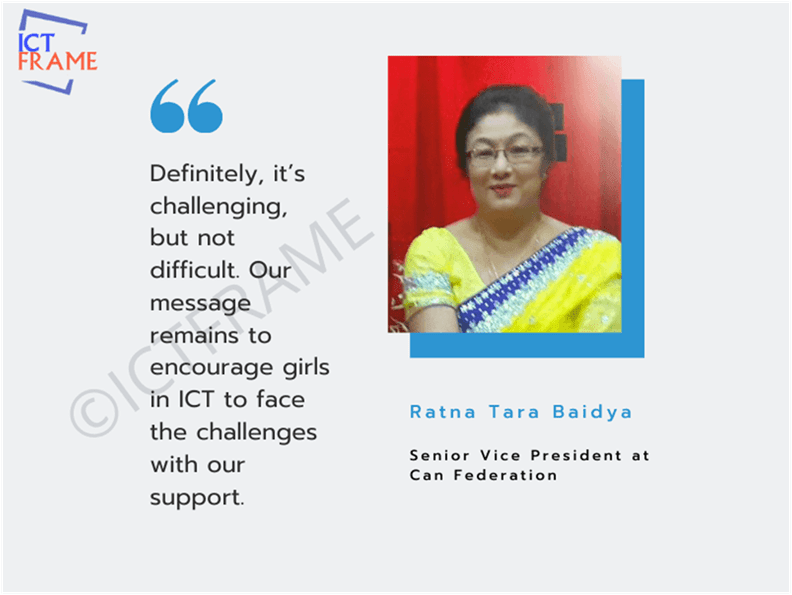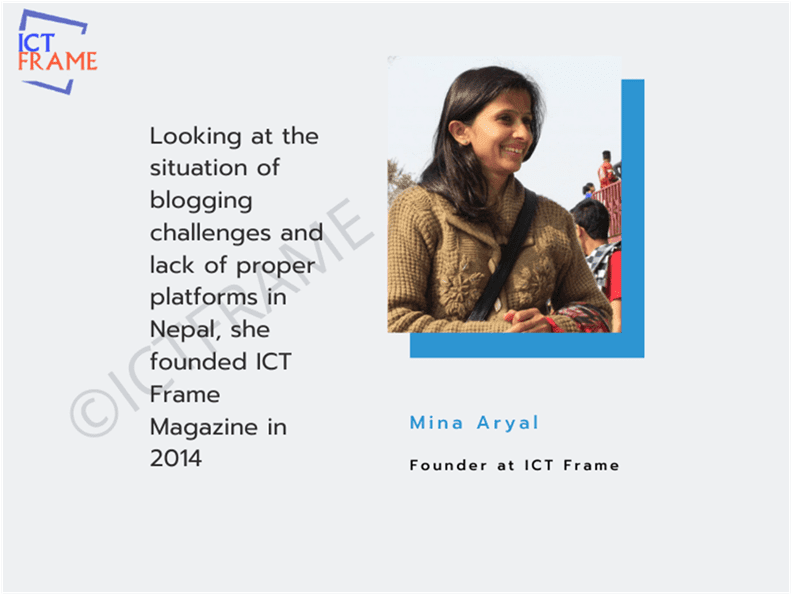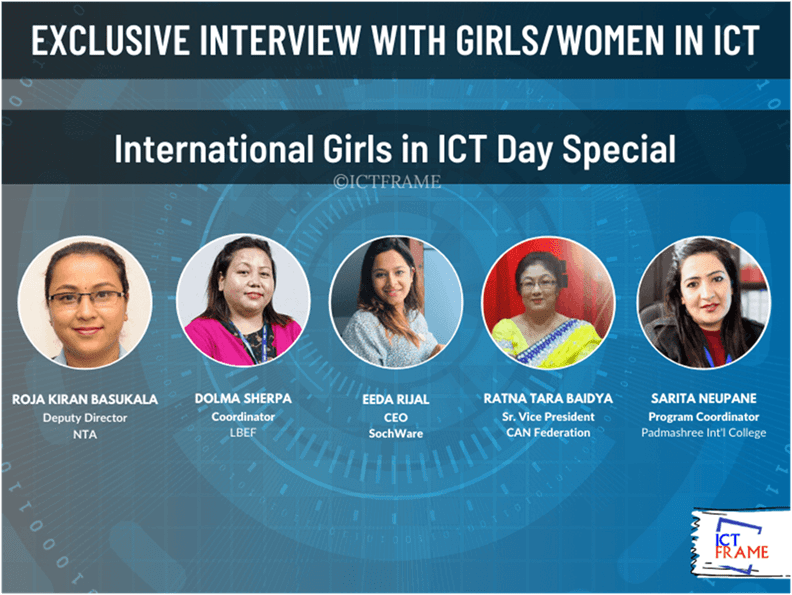Exclusive Interview With the Women in ICT | International Girls in ICT Day Special
23 April Kathmandu, 2020
The ICT sector is a growing industry globally and it certainly can use all the wide range of ICT talents. There is a huge gap between digital skills needed in the sector and the job seekers with the required technical knowledge.
Today we are celebrating International Girls in ICT Day which aims to empower girls and women in the technical field globally. It is an initiation of the International Telecommunications Union (ITU) with the slogan “Expand Horizons, Change Attitude”. Supporting the education of women in ICT is also in line with the United Nation’s Sustainable Development Goals (SDGs).
On April 23, 2020 (Thursday), TechPana is organizing a Facebook Live event to address the involvement and stories of ‘Girls in ICT’ in Nepal. It will talk about both the opportunities and challenges for women in the ICT sector and how to empower them. You can witness the event live on Facebook starting from 3:15 PM.
Similarly, there are many strong women in technology who are contributing to Nepal’s ICT sector. They are leading by example and empowering girls and women around the nation with their work.
Here’s what they have to say about girls and women in ICT.
Interview with Roja Kiran Basukala, Deputy Director at NTA
Q. When did you start your Journey in ICT?
A: I graduated in Computer Engineering from Pulchowk Campus in 2063 B.S. Then, I worked in an IT company and eventually went to Korea where I finished my Masters. After getting my Masters’s degree, I returned to Nepal. I have been working in the NTA for 10 years now.
Q. What are the challenges and opportunities for Girls and Women in ICT in Nepal?
A: To start off, I would say that the presence and involvement of women in ICT are low in every part of the world, not just Nepal. The initiation of ‘International Girls in ICT Day’ runs events, interaction programs, training, and workshops throughout the year to empower women and increase their presence in the ICT sector. Talking about opportunities, ICT is in a blending trend with all other sectors in Nepal. For example, we have topics like e-learning, telemedicine, and e-agriculture which are revolutionary for the ICT sector in Nepal. There are provisions of working from home which we are witnessing on a wide scale during the current lockdown.
People often say that without education, you can’t achieve anything. But times have come when we are realizing that without IT, we can’t sustain our career. There are growing opportunities for women and they need to come forward realizing the immediate needs of ICT.

Q. How are the Government and other organizations supporting the initiative of Girls in ICT?
A: As I mentioned earlier, it is a global issue. So, the ITU has initiated a mission to empower girls in ICT and Nepal is a member country of this initiative. The ITU has been requesting each of its member countries to support the movement. Similarly, we have been supporting the cause and celebrating Girls in ICT Day since 2013. As a part of this initiation, we have been organizing events like essay competition and quiz competition to draw the attention of women towards ICT. Also, we have conducted Presentation contests to encourage women to display their communication skills.
Every year we organize an event or workshop or training by requesting several stakeholders to take part in this initiative. I believe all of us belonging to different perspectives, morality, and sectors have to take part actively in this to bring significant changes.
Q. What is the situation of ICT for Girls outside Kathmandu Valley and what are we doing to empower them?
A: There are certainly some challenges for girls in remote areas of Nepal. The first thing is the ICT education and awareness. From my personal experience, we provided WordPress training to girls in Humla with an attendance of over 100 girls. We primarily focus on awareness campaigns where not just girls but people, in general, have no idea about ICT. In the areas with better infrastructures and availability of resources, we organize training and workshops. And, we also organize hackathons in cities like Butwal, Pokhara, and Kathmandu where there are trained individuals and better infrastructure. We aim to maximize productivity from the hackathons and convert ideas into startups.
Not just in Kathmandu valley but we organize several awareness programs and skill-based training workshops in remote areas of Nepal. Unfortunately due to the lockdown, we couldn’t execute our plans for this year’s Girls in ICT Day. Similarly, we are trying to set up virtual meetings and events for conducting training and workshop. Hopefully, we can come up with more strategies and implement them after the nationwide lockdown.
Interview with Dolma Sherpa, Coordinator at LBEF
Q. When did you start your Journey in ICT?
A: I started my journey from 2002 as I finished a 2 years course from NIIT (Shimla). After completion of the course, I joined the job in the same institution as an instructor in Computer Science. I migrated to Nepal in 2006 and started working as a primary teacher in schools. Eventually, I reached the position where I am today as the coordinator for BSc. IT and MBA at LBEF.
Q. What are the challenges and opportunities for Girls in ICT in the context of Nepal?
A: Undoubtedly there are many opportunities in Nepal. Maybe that’s why I am involved in the IT field. However, there are also several challenges that point towards the lack of awareness regarding ICT. Let’s just take the example of the recent trend in data breaches in Nepal. It has been said that the major reason behind the incidents was the lack of proper utilization of cybersecurity knowledge and methods. So, I incline towards the major root cause being the lack of awareness for major ICT issues in Nepal. And, this also includes the challenges faced by women who are trying to make their mark in the IT field. But I believe where there are challenges, there are also opportunities to prove yourself. So definitely, there are a lot of opportunities in Nepal for Girls in ICT.

Q. What do you think is the reason behind the low involvement of Girls in ICT in Nepal?
A: Well, it’s definitely not because they don’t take an interest in the field. And it’s most certainly not because there are not enough opportunities. I think what separates the opportunities for girls is the ancient practices of women involving in household activities. So, people have developed a perspective of women where they are more involved in society and other activities rather than professional activities. For example, when it comes to coding and programming, it can be a long-term task. So, bound by the responsibilities towards family and society, women can’t invest enough time in learning new things in the field. This phenomenon is quite difficult to breach and this might be what’s keeping them from pursuing a career in ICT, or any other field for that matter.
Q. What type of support do you see from the Government and private organizations the development of ICT in Nepal?
A: The government is supporting the initiation of Girls in ICT for sure. Even CAN (Computer Association of Nepal) organizes several events on empowering youths and girls in ICT. And, there is a lot of support from private organizations in the academic sector as well. These organizations provide guest lectures, organize seminars and workshops in different colleges of Nepal. So, no doubt there is the active involvement of both government and private organizations for the cause.
Q. What is the situation of ICT for women in remote areas and what are we doing to empower them?
A: Obviously in Kathmandu, there is a huge improvement in the ICT sector and opportunities for girls in ICT. But, it is not the case when it comes to remote areas of Nepal. The major reason behind this is the lack of awareness in people. However, I have come to know that private organizations are initiating awareness campaigns and workshops to bridge this gap. I wrote a thesis about e-learning where I came to learn that OLE Nepal provides resources and tools to the students in Government schools in remote areas of Nepal. So, there are some organizations doing their best to bring a change. And I came to the conclusion that with more involvement of government agencies and private organizations, we can create opportunities by raising awareness.
Interview with Eeda Rijal, CEO at Sochware
Q. When did you start your Journey in ICT?
A: I would say that I started at an early age since Grade 8-9. I was enthusiastic about electronics and graduated in Electronics and Communications Engineering. I pursued my career in the field and attended training, workshops, and also worked as an MSP (Microsoft Student Partner). The Sochware team also represented Nepal in Microsoft’s Imagine Cup 2018 which we won.
Q. What are the challenges and opportunities for Girls in ICT in the context of Nepal?
A: Well, the tech industry always has been a gender-dominated industry for a long time. However, it is gradually changing and opportunities for women are in an increasing trend. What I truly believe is that technology has no gender and we are allowed to pursue anything that interests us. So, if we pursue our passion and work hard in the field, we are definitely going to succeed and pave the path for more girls in ICT.
Talking about the challenges, I would say that there are instances when people don’t really trust girls in technology. I have witnessed such stereotypical thinking among the people. Even when talking to clients, they prefer talking to ‘technical people’ when I am a technical person myself. So, I have to verify that I am a girl in technology in most cases. Furthermore, when it comes to education, I find myself teaching a class of 30 students and see only about 5 girls in the class.

Q. What type of support do you see for Girls and Women in ICT in Nepal?
A: Despite the challenges, the community for girls in technology in Nepal is improving drastically. It is definitely going strong and supporting more women who want to come forward in this field. So, we organize several technical community events to empower women. I, myself, am in Women Techmakers Community as a core member. We run programs for empowering girls, especially students through Microsoft’s education platform. The community support is very strong and welcoming for the newcomers in the field and also for the girls who want to pursue a career in the ICT industry.
Likewise, there is huge support from the government with the event of Girls in ICT Day every year. In fact, I participated in an app development contest in one of the events in the past and won as the 2nd runner up. There are several such initiations from the government and private organizations as well. There certainly has been an improvement and we are witnessing a growth in the number of girls in the field compared to their participation in the past 4-5 years.
Q. What is the situation of ICT for women in remote areas and what are we doing to empower them?
A: We can see active participation from women in major cities like Kathmandu, Butwal, Pokhara, etc. However, the number is much lower in remote areas. In fact, I have an interesting story about an incident in Damak. I visited Damak a few months back to provide Computer related training. What I found was a growth in the number of girls in classes possibly due to the inclusion of Engineering-oriented courses in Grade 8-9 by the Nepal Government. So, more girl students were participating in technology which is unlike major cities in Nepal. I was facilitating to train around 50 students out of which, 20-25 were girls. Moreover, I found there computational skills and problem-solving skills remarkably high. However, these girls were affected by the traditional notion of girls not participating in technical fields.
To change this, we need to bring more women in the field as role models for aspiring girls in ICT. Not just us, their families also have a huge role to play. Their families have to show support and encourage them to participate not only in the medical field or public health but also in the technical field.
Interview with Ratna Tara Baidya, Senior Vice President at CAN Federation
Q. When did you start your Journey in ICT?
A: It has been a very long journey (laughs). I started my journey in 1985 after completing my Masters in English Literature. I applied for a one-year training along with 3 other girls. Luckily two of us passed examinations and joined a job in DSI (Data Systems International) itself. I worked as a computer programmer at DSI from 1985 to 1991. I started as a program developer when there was no basic provision of learning C programming. We had to program in an 8MB hard disk which seemed like huge storage in those days, can you imagine? After 1991, I started to involve more in training institutes and projects. In 1994, I joined Nepal Bangladesh Bank and worked there for 25 years as the IT Department chief.
Q. What are the challenges and opportunities for Girls in ICT in the context of Nepal?
A: I believe the challenges today are far less complicated with palm-to-palm technology. So, if somebody is interested to learn, they can easily get access to the resources and information. A growing challenge for girls in today’s technology is also cyber threats. There is a lack of information regarding the proper use of social media and online platforms. However, most girls are aware of the pros and cons of technology as compared to the situation in the past.
Talking about the opportunities, I think every sector is dependent on technology. So, there is a wide range of opportunities for girls who are passionate about the ICT sector for sure.

Q. How can we empower girls in ICT and increase their involvement in the sector?
A: Firstly, there is a huge misconception about girls being restricted to household activities and society. This traditional belief still prevails in society due to which girls are not getting the support and platform to grow. However, there is a significant change in this trend with more people and families getting awareness. We are witnessing more involvement of girls in Engineering and other technology sectors.
There is a committee in CAN called “Women in IT” which has been contributing to raise awareness and empower women to involve more in ICT. The committee has organized events, campaigns, and workshops in schools and colleges. Definitely, it’s challenging, but not difficult. Our message remains to encourage them to face the challenges with our support. Similarly, there are other communities that support girls in ICT and empower newcomers in the field. It will take some time but surely we can achieve the growth that we are expecting.
Finally, what I have to add is we are experiencing the use of technology the most during the lockdown. So, my request to all the girls and women is that take note of how important and necessary this field is and follow your passion. Don’t hesitate to accept challenges and adapt to the ever-changing technology.
Interview with Sarita Neupane, the Program Coordinator at Padmashree International College
Q. When did you start your Journey in ICT?
A: I did my Bachelor’s in Computer Science from ASCOL in 2004 and MSc. IT from NCIT. I entered the market in late 2009 and started working as a lecturer in Computer Science and IT at St. Xavier’s College. I have been an academician since the start of my career in ICT.
Q. What are the challenges and opportunities for Girls in ICT in the context of Nepal?
A: Compared to the past, students and parents have become more aware of the opportunities in technology. As a result, there are lesser challenges than before. However, I believe married women face more challenges to balance a career in technology or any field. It is difficult to dedicate full time to work when there is a responsibility towards family and children. But this hasn’t stopped most women to pursue their career in ICT. Being a girl in ICT myself, I have seen such women and I take this challenge as an opportunity. The challenges may come from the family members who may be unaware of the roles and responsibilities required in the career field.
Another challenge is the mindset of students. There is very low participation of girls in technical courses and the admission in the college where I work is not even 33%. In fact, I was a single girl in my class while studying both Bachelors and Masters. So, I had to fight my way in the market and get to the position I am currently at.

Q. What type of support do you see for the development of ICT in Nepal?
A: There is a lot of support from the private organizations for the betterment of girls in ICT. But I don’t think there are enough initiations from the government to empower girls and draw their attention towards the ICT sector in Nepal.
Q. What is the situation of ICT for women in remote areas and what are we doing to empower them?
A: I have been involved in the academics field since the start of my career. And yes, I understand the challenges in remote areas outside the valley. In fact, I get called more often for guest lectures as a role model for girl students who are completely new in the field. These girls need motivation and proper guidance to excel in the field and obviously, I wish to lead by example. And, I wish to see more and more girls in this field. Moreover, my aim stands to empower and bring more girls in technology so that they don’t have to go through what I did as a single girl student in my class. I believe that together, girls gain more confidence and have a better chance to excel if provided with awareness and resources.

Meet Mina Aryal, Founder at ICTFrame
Mina Aryal completed her MBS from Tribhuvan University in 2011. Since then, she had a keen interest in technology, especially in the blogging field. She attained WordPress and other ICT training and thus, wanted to contribute to the field. Looking at the situation of blogging challenges and lack of proper platforms in Nepal, she founded ICT Frame Magazine in 2014 (Regd. November 2016).
ICT Frame is the first woman-led online magazine in Nepal that provides ICT related news in Nepali and English languages.
Final Thought
With challenges, there are certainly a lot of opportunities as well. It might depend on person to person on how they see it. But, it is for sure that if communities, government, and private organizations work together, they can empower a lot of girls to involve more in the ICT sector.
If you get the chance to do it yourself, don’t hesitate or hold back. Girls in ICT is certainly a pressing topic and people need to talk about it more.
Have anything to add? Please let us know in the comments!
Related Articles
How are Colleges in Nepal Conducting Online Classes?
Are You a Tech Blogger? This event Is Specially For You






